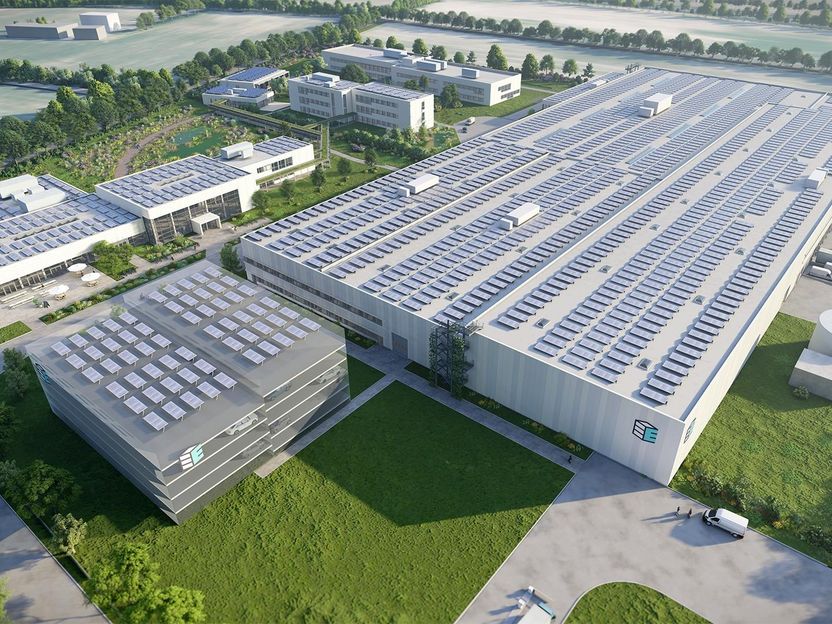Industrial Mass Production without Negative Impacts
Produce electrolysers without negative impacts on the environment
Advertisement
The electrolyser producer Enapter has set itself the goal of developing its entire production process to run without negative impacts on the environment. As an important step on this journey, it is building the Enapter Campus production facility, which will be powered entirely from renewable energy produced on-site and in the neighbouring Bioenergiepark. The site in in Saerbeck, North Rhine-Westphalia combines electrolyser production, an R&D building, administration and office space, as well as a cantine over 82,000 square metres. Now the company wants to investigate what other measures can be implemented to achieve its “Life Cycle Impact Zero” aspirations – together with researchers from Fraunhofer UMSICHT, the Wuppertal Institute and the Institute of Sustainable Nutrition (iSuN) of FH Münster.

The new Enapter Campus in Saerbeck.
© Enapter
With the Life Cycle Impact Zero project, started on April 15, 2022, the parties want to develop and apply an especially comprehensive and holistic approach to environmental assessment. This includes chemical manufacturing and electrolyser production, as well as matters like the use of energy and water resources, the generation of waste or the human factor in general. This is intended to cover all interactions between business and people. That includes, in particular, Enapter’s employees, but also people in upstream and downstream value chains, users of the technology or residents close to the production site. A concept for sustainable employee catering is also being developed.
“On top of this, the project comprehensively explores the recycling of critical raw materials that are essential for electrolysis, which only emphasises the pioneering character of Life Cycle Impact Zero”, says Dr. Henning Wilts, Director of the Circular Economy Division at The Wuppertal Institute.
The basis for all environmental assessment that will be carried out is ISO 14040. The recognised international standard divides the research into four phases: Aim and scope of the study, inventory analaysis, impact assessment, as well as interpretation. Sensitivity analyses and scenario techniques are also used as further methods.
On the basis of these analyses, the 18-month project should derive concrete measures to avoid negative environmental impacts completely, if possible, for example in production, employee mobility or in energy supply. Furthermore, it will examine whether these measures are transferable to Enapter’s other locations – such as in Italy. Following on from the project, the steps defined should be implemented by Enapter in the next phase. In the subsequent Phase 3, a renewed analysis is planned. This will determine if the technological innovations achieved by then in the production and use of Enapter’s electrolysers can enable additional ecological improvements.
“Electrolysers are a key component of a future hydrogen economy. We are excited that, together with Enapter and our scientific partners, we can work to anchor this technology regionally and in NRW, and in doing so, advance the achievement of important sustainability goals”, says Jürgen Bertling, Deputy Head of Department Sustainability and Participation at Fraunhofer UMSICHT.
The Life Cycle Impact Zero project is supported by the State of NRW.
Other news from the department manufacturing
Most read news
More news from our other portals
Something is happening in the chemical industry ...
This is what true pioneering spirit looks like: Plenty of innovative start-ups are bringing fresh ideas, lifeblood and entrepreneurial spirit to change tomorrow's world for the better. Immerse yourself in the world of these young companies and take the opportunity to get in touch with the founders.
































































